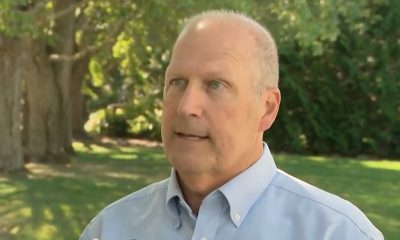Politics
Gay N.H. lawmaker seeks to become first out candidate elected to state Senate
David Pierce in 2009 testified in support of New Hampshire’s same-sex marriage bill

HANOVER, N.H.—A New Hampshire lawmaker seeking to become the first gay state senator who ran as an out candidate said education, the economy and health care remain the top issues going into Election Day.
“I talk about the hypothetical student who works like hell to do the best she can: straight As, extracurricular activities, really good SAT scores or whatever, but then [colleges] see that she’s from a place that doesn’t have accreditation [from the] College Admissions Council and they can’t give her full consideration,” state Rep. David Pierce told the Washington Blade during an interview earlier this month as he referenced the possibility that Claremont’s struggling Stevens High School could lose its accreditation. “That’s just criminal. And so that’s got to change.”
Pierce, who has represented House District 9 that includes Dartmouth College since 2006, would represent the newly redistricted 5th Senate District that includes the cities of Lebanon and Claremont and Hanover and six other towns along the Connecticut River and in the state’s Upper Valley region if elected on Nov. 6.
He criticized the state’s Republican-controlled legislature for cutting the University of New Hampshire’s budget by nearly 50 percent last year.
“UNH students graduate with the highest debt load of in-state students of any students in the country,” he said. “UNH students pay the highest in-state tuition rate of any students in the country. And you’re destabilizing the family — middle class families — if they can’t send their kids to schools. If they can get them to school, it’s a huge chunk of their monthly income towards education. If they can’t send them to [get an] education, I talk about how we’re dooming our kids to be the ones to sell cigarettes and alcohol to Massachusetts because that’s how we’re going to raise revenue. And you can’t attract businesses to New Hampshire unless you have an educated and skilled workforce.”
Pierce further criticized GOP lawmakers for cutting the state’s budget by 11 percent in 201.
“Whether you agree or disagree that government should be spending money in a state’s economy is a philosophical argument that we can have, but the point is that it does happen and the state does contribute X percent to the state’s [Gross Domestic Product] GDP,” he said. “When you cut 11 percent of that contribution, you’re not expanding the economy. You’re shrinking it. This legislature came in with the promise to focus like a laser on rebuilding the economy and creating jobs. And the major policy they’ve passed in the budget shrinks the economy. That’s why you’ve seen the unemployment rate ticking up in New Hampshire.”
Pierce also accused New Hampshire Republicans of falling “right in line with the national Republican party about declaring a war on women’s health.” He criticized House Speaker Bill O’Brien and other GOP leaders for attaching an anti-choice bill that previously failed to a measure that would have given tax credits to high tech companies. Pierce also criticized GOP lawmakers for spearheading the passage of a bill in May that repealed a law mandating insurance coverage of contraceptives.
“What that means of course is fewer women, fewer families have access to contraception,” he said.
Pierce spoke to the Blade on the same day he and his partner of 20 years, Dr. Robert Duff, celebrated their 20th anniversary. The couple who live in Etna with their two young daughters Emma and Grace had their first date at the now closed Au Pied de Cochon restaurant in Georgetown on Oct. 5, 1992.
Pierce highlighted the couple’s children during in his 2009 speech in support of New Hampshire’s same-sex marriage bill just before the House narrowly approved it. He also spoke about his own struggle to come to terms with his sexual orientation as a child growing up in a religious family in Texas.
“I remember being that scared 12-year-old little boy coming to grips with the fact that I’m different than everybody else,” said Pierce, pointing out that he had even thought about potentially taking his own life. “Fortunately I didn’t do that, but I grew up very scared of who I was and what it meant for my life. And then to see myself giving the floor speech — the anchor floor speech — for marriage equality and seeing it pass was one of the most significant moments of my life. I would love for me to be able to go back and talk to that 12-year-old scared little kid and say ‘It’s going to be okay. You’re going to come through this in fact you’re going to do great things with this.’”
“I had such an overbearing headache because everything was so clinched because I thought I knew what was coming,” he said, recalling how he felt as he entered the chamber. “I thought that the floor speeches were going to be disgusting and immoral and acidic and so I was prepared for it, but scared to death as to what was going to happen. And then it slowly — we were taking one procedural vote after another — and it just became clear. There was one vote in particular that was the tipping point. It was a vote on the prime sponsor’s amendment to his own bill. If that had passed then the entire measure would have passed. If it failed, then the whole measure would have failed and the interim measure failed by 22 votes. They continued trying to resurrect it and all this other stuff, but every vote was getting further and further and further and further away from the repeal.”
Pierce’s opponent, state Rep. Joe Osgood, has pointed out the fact the Gay and Lesbian Victory Fund has endorsed his campaign in e-mails to supporters and during interviews with local media outlets.
“I want to talk about the economy and jobs, how we get the economy going again, how we can guarantee the fundamental right to an education and recognize that health care is a right and ensure access to preventative services, non-discrimination for women, equal pay for equal work,” said Pierce as he pointed to his response to a reporter’s question about Osgood highlighting the Victory Fund’s endorsement and his sexual orientation. “The things that the voters care about are the same things that I care about.”
Beyond politics, however, Pierce stressed his state Senate candidacy remains personal.
“It’s just an incredible journey; I feel incredibly blessed to have had these opportunities,” he said. “Another part of that that really impacts me spiritually is that that scared little 12-year-old kid who is today living in Durham, N.H., or Windham, N.H., can see that it’s okay. And that’s a big part of why I do it because I don’t want kids today going through what I had to go through.”
He added his election to the state Senate as an openly gay man would say “a lot about New Hampshire.”
“It says a lot about the live free or die attitude of New Hampshire,” said Pierce. “It’s nobody business. And where is it written that we should be able to control how people live their lives and make the most personal choices in their lives? And so to the extent that my candidacy and my service in the Senate will represent that, I think that’s wonderful.”
Congress
McBride, other US lawmakers travel to Denmark
Trump’s demand for Greenland’s annexation overshadowed trip

Delaware Congresswoman Sarah McBride is among the 11 members of Congress who traveled to Denmark over the past weekend amid President Donald Trump’s continued calls for the U.S. to take control of Greenland.
McBride, the first openly transgender person elected to Congress, traveled to Copenhagen, the Danish capital, with U.S. Sens. Chris Coons (D-Del.), Thom Tillis (R-N.C.), Jeanne Shaheen (D-N.H.), Dick Durbin (D-Ill.), and Lisa Murkowski (R-Alaska) and U.S. Reps. Steny Hoyer (D-Md.), Gregory Meeks (D-N.Y.), Madeleine Dean (D-Pa.), Don Bacon (R-Neb.), and Sarah Jacobs (D-Calif.). The lawmakers met with Danish Prime Minister Mette Frederiksen and Greenlandic MP Pipaluk Lynge, among others.
“I’m grateful to Sen. Coons for his leadership in bringing together a bipartisan, bicameral delegation to reaffirm our support in Congress for our NATO ally, Denmark,” said McBride in a press release that detailed the trip. “Delaware understands that our security and prosperity depend on strong partnerships rooted in mutual respect, sovereignty, and self-determination. At a time of growing global instability, this trip could not be more poignant.”
Greenland is a self-governing territory of Denmark with a population of less than 60,000 people. Trump maintains the U.S. needs to control the mineral-rich island in the Arctic Ocean between Europe and North America because of national security.
The Associated Press notes thousands of people on Saturday in Nuuk, the Greenlandic capital, protested against Trump. British Prime Minister Keir Starmer is among those who have criticized Trump over his suggestion the U.S. would impose tariffs against countries that do not support U.S. annexation of Greenland.
A poll that Sermitsiaq, a Greenlandic newspaper, and Berlingske, a Danish newspaper, commissioned last January indicates 85 percent do not want Greenland to become part of the U.S. The pro-independence Demokraatit party won parliamentary elections that took place on March 12, 2025.
“At this critical juncture for our countries, our message was clear as members of Congress: we value the U.S.-Denmark partnership, the NATO alliance, and the right of Greenlanders to self-determination,” said McBride on Sunday in a Facebook post that contained pictures of her and her fellow lawmakers meeting with their Danish and Greenlandic counterparts.
Congress
Van Hollen speaks at ‘ICE Out for Good’ protest in D.C.
ICE agent killed Renee Nicole Good in Minneapolis on Jan. 7

U.S. Sen. Chris Van Hollen (D-Md.) is among those who spoke at an “ICE Out for Good” protest that took place outside U.S. Customs and Border Protection’s headquarters in D.C. on Tuesday.
The protest took place six days after a U.S. Immigration and Customs Enforcement agent shot and killed Renee Nicole Good, a 37-year-old woman in Minneapolis.
Good left behind her wife and three children.
(Video by Michael K. Lavers)
Congress
Advocates say MTG bill threatens trans youth, families, and doctors
The “Protect Children’s Innocence” Act passed in the House

Georgia Congresswoman Marjorie Taylor Greene has a long history of targeting the transgender community as part of her political agenda. Now, after announcing her resignation from the U.S. House of Representatives, attempting to take away trans rights may be the last thing she does in her official capacity.
The proposed legislation, dubbed “Protect Children’s Innocence Act” is among the most extreme anti-trans measures to move through Congress. It would put doctors in jail for up to 10 years if they provide gender-affirming care to minors — including prescribing hormone replacement therapy to adolescents or puberty blockers to younger children. The bill also aims to halt gender-affirming surgeries for minors, though those procedures are rare.
Greene herself described the bill on X, saying if passed, “it would make it a Class C felony to trans a child under 18.”
According to KFF, a nonpartisan source for health policy research, polling, and journalism, 27 states have enacted policies limiting youth access to gender-affirming care. Roughly half of all trans youth ages 13–17 live in a state with such restrictions, and 24 states impose professional or legal penalties on health care practitioners who provide that care.
Greene has repeatedly introduced the bill since 2021, the year she entered Congress, but it failed to advance. Now, in exchange for her support for the National Defense Authorization Act, the legislation reached the House floor for the first time.
According to the 19th, U.S. Rep. Sarah McBride (D-Del.), the first trans member of Congress, rebuked Republicans on the Capitol steps Wednesday for advancing anti-trans legislation while allowing Affordable Care Act tax credits to expire — a move expected to raise health care costs for millions of Americans.
“They would rather have us focus in and debate a misunderstood and vulnerable one percent of the population, instead of focusing in on the fact that they are raiding everyone’s health care,” McBride said. “They are obsessed with trans people … they are consumed with this.”
Polling suggests the public largely opposes criminalizing gender-affirming care.
A recent survey by the Human Rights Campaign and Global Strategy Group found that 73 percent of voters in U.S. House battleground districts oppose laws that would jail doctors or parents for providing transition-related care. Additionally, 77 percent oppose forcing trans people off medically recommended medication. Nearly seven in 10 Americans said politicians are not informed enough to make decisions about medical care for trans youth.
The bill passed the House and now heads to the U.S. Senate for further consideration.
According to reporting by Erin Reed of Erin In The Morning, three Democrats — U.S. Reps. Henry Cuellar and Vicente Gonzalez of Texas and Don Davis of North Carolina — crossed party lines to vote in favor of the felony ban, joining 213 Republicans. A total of 207 Democrats voted against the bill, while three lawmakers from both parties abstained.
Advocates and lawmakers warned the bill is dangerous and unprecedented during a multi-organizational press call Tuesday. Leaders from the Human Rights Campaign and the Trevor Project joined U.S. Rep. Becca Balint (D-Vt.), Dr. Kenneth Haller, and parents of trans youth to discuss the potential impact of restrictive policies like Greene’s — particularly in contrast to President Donald Trump’s leniency toward certain criminals, with more than 1,500 pardons issued this year.
“Our MAGA GOP government has pardoned drug traffickers. They’ve pardoned people who tried to overthrow the government on January 6, but now they want to put pediatricians and parents into a jail cell for caring for their kids,” said Human Rights Campaign President Kelley Robinson. “No one asked for Marjorie Taylor Greene or Dan Crenshaw or any politician to be in their doctor’s office, and they should mind their own business.”
Balint, co-chair of the Congressional Equality Caucus, questioned why medical decisions are being made by lawmakers with no clinical expertise.
“Parents and doctors already have to worry about state laws banning care for their kids, and this bill would introduce the risk of federal criminal prosecution,” Balint said. “We’re talking about jail time. We’re talking about locking people up for basic medical care, care that is evidence-based, age-appropriate and life-saving.”
“These are decisions that should be made by doctors and parents and those kids that need this gender-affirming care, not certainly by Marjorie Taylor Greene.”
Haller, an emeritus professor of pediatrics at St. Louis University School of Medicine, described the legislation as rooted in ideology rather than medicine.
“It is not science, it is just blind ideology,” Haller said.
“The doctor tells you that as parents, as well as the doctor themselves, could be convicted of a felony and be sentenced up to 10 years in prison just for pursuing a course of action that will give your child their only chance for a happy and healthy future,” he added. “It is not in the state’s best interests, and certainly not in the interests of us, the citizens of this country, to interfere with medical decisions that people make about their own bodies and their own lives.”
Haller’s sentiment is echoed by doctors across the country.
The American Medical Association, the nation’s largest organization that represents doctors across the country in various parts of medicine has a longstanding support for gender-affirming care.
“The AMA supports public and private health insurance coverage for treatment of gender dysphoria and opposes the denial of health insurance based on sexual orientation or gender identity,” their website reads.
Rodrigo Heng-Lehtinen, senior vice president of public engagement campaigns at the Trevor Project, agreed.
“In Marjorie Taylor Greene’s bill [it] even goes so far as to criminalize and throw a parent in jail for this,” Heng-Lehtinen said. “Medical decisions should be between patients, families, and their doctors.”
Rachel Gonzalez, a parent of a transgender teen and LGBTQ advocate, said the bill would harm families trying to act in their children’s best interests.
“No politician should be in any doctor’s office or in our living room making private health care decisions — especially not Marjorie Taylor Greene,” Gonzalez said. “My daughter and no trans youth should ever be used as a political pawn.”
Other LGBTQ rights activists also condemned the legislation.
Tyler Hack, executive director of the Christopher Street Project, called the bill “an abominable attack on the transgender community.”
“Marjorie Taylor Greene’s last-ditch effort to bring her 3-times failed bill to a vote is an abominable attack on the transgender community and further cements a Congressional career defined by hate and bigotry,” they said. “We are counting down the days until she’s off Capitol Hill — but as the bill goes to the floor this week, our leaders must stand up one last time to her BS and protect the safety of queer kids and medical providers. Full stop.”
Hack added that “healthcare is a right, not a privilege” in the U.S., and this attack on trans healthcare is an attack on queer rights altogether.
“Marjorie Taylor Greene has no place in deciding what care is necessary,” Hack added. “This is another attempt to legislate trans and queer people out of existence while peddling an agenda rooted in pseudoscience and extremism.”
U.S. Rep. Mark Takano (D-Calif.), chair of the Congressional Equality Caucus, also denounced the legislation.
“This bill is the most extreme anti-transgender legislation to ever pass through the House of Representatives and a direct attack on the rights of parents to work with their children and their doctors to provide them with the medical care they need,” Takano said. “This bill is beyond cruel and its passage will forever be a stain on the institution of the United States Congress.”
The bill is unlikely to advance in the Senate, where it would need 60 votes to pass.




















